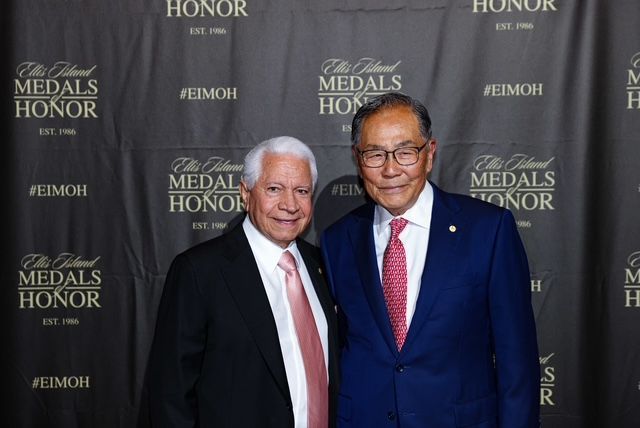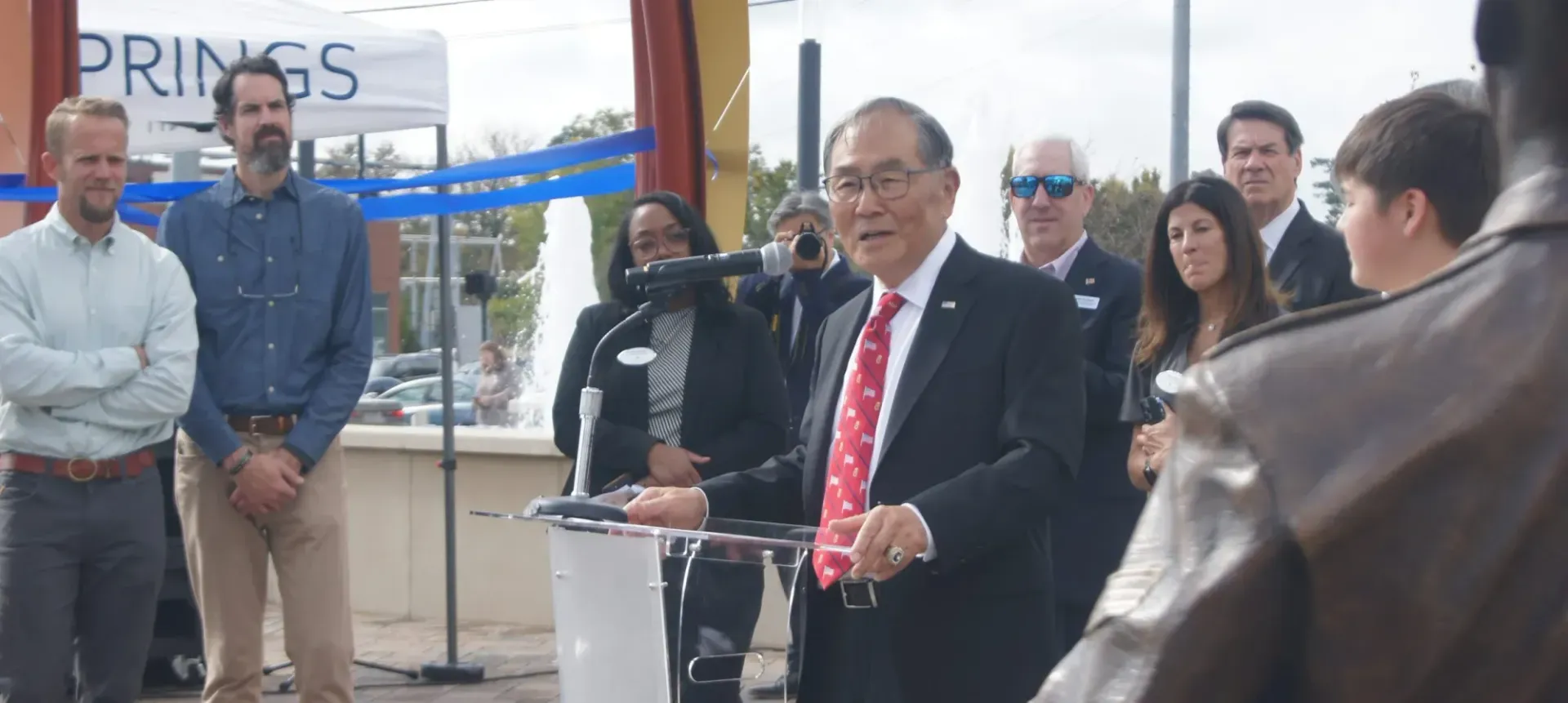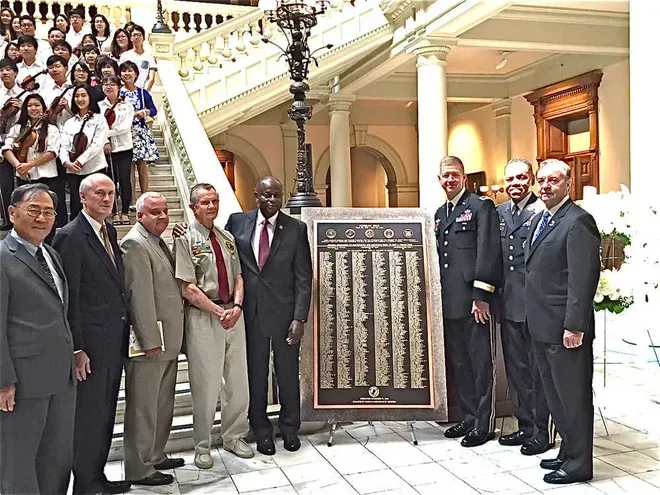News Articles

The Ellis Island Honors Society honors the importance of immigration to America’s prosperity and celebrates the contributions immigrants and their progeny have made to our nation. In 1986, Ellis Island Honors Society founded the Ellis Island Medals of Honor to commemorate the indefatigable spirit of those who immigrated to the United States during the Ellis Island era. The Medal is presented annually to those who have shown an outstanding commitment to serving our nation either professionally, culturally or civically, among other criteria.

Artist Curtis Pittman, left, cheers as local philanthropist and business leader Sunny Park, right, and his family cut the ribbon Nov. 11 on Veterans Park’s new sculpture — “Be the Light.” The Veterans Day ceremonies in Sandy Springs also saw the unveiling of Kevin Chambers’ “Three Generations” at the park. HAYDEN SUMLIN/APPEN MEDIA

The president of one of Atlanta’s fastest-growing janitorial and facility maintenance companies hopes that one day his employees will leave him for a better life. He’s even helping them save money to start their own businesses. When General Building Maintenance Inc. (GBM) President Sunny Park realized that high turnover was an inevitable part of his business, he decided to help people on their way by paying cash bonuses to cleaners and other low-wage employees who open savings accounts. “These people never had a savings account. And I thought about their future. I didn’t have money once before,” he said. Park came to the United States from Korea in 1967 to attend Indiana University. Five years after he moved to Atlanta, he started GBM because so many people in Atlanta’s Korean community asked him for help finding a job. “I found out I can create a business and utilize that as the job provider for those people,” said Park. At the time, he was an insurance agent. He started GBM in 1983 with a contract to clean the Presidential Office Park complex near Doraville. Today, the company owns the complex and is headquartered in 8,800 square feet there. GBM also has 12 branch offices from Baltimore to Dallas. Employment has doubled and revenues have nearly tripled since 1991, when the company had 250 workers and $7.6 million in revenues. In 1997, Park said he expects GBM to reach $22 million in revenues. When Park started GBM, most facility maintenance companies used part-time labor. However, part-time employees work with a specific goal in mind: paying off a car, buying a TV, paying a bill. So Park hired full-time employees, who he said focus more on quality and are more loyal. Hiring for full-time jobs prevented some turnover, but, he added, “As we grow, we are finding a problem keeping good people. We train people and then people leave. So we’re losing a lot of investment.” In addition to offering full-time work, the promise of advancement in the company and other benefits, Park made it a policy to pay a little more than the competition.

US Army Sgt. Fernando Nino and Sgt. Mark Walker were cleared of any wrong-doing by a US Army military court in the death of two Korean kids. The two young girls were run down by an armored vehicle manned by the two American servicemen late last year. Since the incident, the two Americans had to endure constant fear of bodily harms by angy Koreans and were confined to the army base. Soon after the acquittal by the all-military jury, the men secretly left Korea for an unknown destination. The 36-year old Walker phoned his sister Lynn Samples (age 51) in Acworth, GA, soon after the trial on October 22nd, and told her that he would be getting out of Korea soon. Lynn told the Atlanta Journal Constitution that she had no doubt of her brother’s acquittal but had not expected it to come so soon, and that she would love to have her brother back home for Thanksgiving. Sgt. Walker hired a civilian attorney Guy Womack from Houston to defend him in the court and ran up a legal fee of more than $27,000. His family, neighbors, and friends have raised so far less than $2,000 to help pay the legal fee. In the United States, the trial of the two servicemen is being viewed by many as politically motivated by a small group of anti-US Korean activists. This view is also shared by some Korean-Americans as well. For example, a group of Koreans calling themselves “Good Neighbors” (http://www.goodneighboring.org) have raised money for Sgt. Walker. The Korean group is led by Sunny Park (60, Park Sun Gun is his real name), who told Walker’s sister that: “We Korean-Americans are your neighbors. We have collected some money for you as a small token of our friendship to our neighbors in trouble. Please convey our friendship to your brother.” Walker’s sister Lynn Samples replied: “I have been praying for my brother but have never dreamed that I would get any help from any Korean.” She said that she had received money from other Koreans as well. Sunny Park told the Korean News that “We don’t want Sgt. Walker ending up a sacrificial lamb of anti-US sentiments in Korea and hope that he would get a fair trial for the traffic accident.” Walker’s defense attorney Womack echoed Park’s sentiment and claimed that Walker’s trial was politically motivated on account of the anti-US demonstrators in South Korea. Womack told the Marietta Daily Journal that: “The ongoing demonstrations are the main reason why the case is going to trial. My suspicion is that because of the political climate in Korea, the commanding general for the second infantry division decided to take this to trail.” Sue Vogan has been raising money for Walker’s legal fees. Sue said: “They have been cleared by an Article 32 investigation and by South Korean police, but protesters in South Korea have forced the military to cave in and take this case to trial. If it weren’t for the protests, I don’t think this would be a big deal.” Sue said that she heard about the trial from her husband who is stationed in Korea. During Walker’s trial on October 21st and 22nd, Womack defended Walker fiercely and put the inept Army prosecutors on the defensive. The so-called prosecutors were defenseless under Womack’s sharp verbal attacks. The jury was more impressed by Womack’s rhetoric than with the fumbling, cowering prosecutors. To add insult to injury, a Korean government observer at the trial stated that “the trial was fair,” apparently reflecting the ‘official’ sentiment of Kim Dae Jung, so-called “President of Korea.”

The idea of studying abroad for an entire semester might be daunting for students, considering the time and money involved, but the International Studies Program has solutions. One of these solutions is the Seoul Women’s University (SWU) Bahrom International Program. This scholarship program gives students the opportunity to spend an extremely structured month during the summer in South Korea, where they attend lectures in English on the culture and history of Korea. Later, some of the Korean students they meet will get the chance to study in the United States for a year. Students attend lectures during the morning and field trips in the afternoon, which cover subjects such as Korean history, language, music, dance, art and film. Activities for the afternoons include Tae kwon do lessons and learning traditional musical instruments and opportunities to select outings on free days. Each student receives 3 credit hours and free tuition. While the program serves as a vehicle to create world citizens of Berry students, it also serves to prepare students from Korea to attend Berry. Each Berry student is paired with a future exchange student at the beginning of the program and attends a dinner at that student’s home. These students will then attend Berry for a full year. As well as lectures being taught in English, the style of teaching is focused toward the environment of American classrooms to help Korean students adjust when they arrive at Berry. The program was initiated and is funded by Sunny Park, a member of Berry’s board of visitors. Park is the president, chief executive officer and founder of General Building Maintenance Inc. in Atlanta. According to a previous story in Berry Magazine, Park decided to start the program after hearing a student say that she had never been to Atlanta. “I want to help young Americans be a part of the world community,” said Park. Since the initial five students went in July 2003, another four students have participated in the program, and on Feb. 7, Park announced that he would continue to give the scholarships to Berry. The program does not require students to obtain visas, only a passport, and all students are housed on the SWU campus. Though SWU is a women’s institution, the program is open to returning male and female Berry students with a minimum 2.5 GPA. The scholarships are awarded through an application process that includes an essay. Previous participant Steven Wagner (year) said that one of his main motivations for applying was his father’s service in the army. “My father got to see Korea while he was in the army, but I wanted to learn about the people of Korea,” Wagner said. The essays are a major part of the selection process. The International Programs Committee is made up of 14 members, with Director of International Programs Sarah Egerer as committee chair. The committee reads each essay and makes the final decision on which students are selected. “I am amazed that all of the students who attend Seoul University come back saying that the experience was life-changing in such a short period of time,” Egerer said. This year’s application deadline for the five scholarships is March 10, and Egerer said she is hoping for heightened interest in the program.

Charles Bannister Gwinnett County Board of Commissioners Chairman Charles Bannister, 66, ousted longtime Gwinnett County Commission Chairman F. Wayne Hill in November, becoming the highest-ranking politician in the county. Bannister, two other Republicans newly elected to the commission and two returning members will be in charge of dealing with the explosive growth in Gwinnett. The commissioners already have shown they mean business. The county and the Lake Lanier Association resolved a five-year fight over wastewater discharge. In May, the commission fired its MARTA representative, Mychal Walker, for violating the board’s ethics policy. Bannister served three terms on the Lilburn City Council in the 1970s before becoming the city’s mayor. In 1984, Bannister ran for the state House of Representatives — and won. He stayed in the General Assembly until 1990, when he lost his re-election bid. Bannister later returned to the political arena and was elected in the mid-1990s to serve in the House. Shirley Franklin City of Atlanta Mayor Three years into her first term as mayor, Shirley Franklin, 61, is edging closer to her vision of a city that’s run like a successful business. The latest step to accomplishing that goal? The Atlanta Committee for Progress — a group organized by Franklin — released its list of objectives in December, including the creation of 60,000 jobs, adding affordable housing, reducing crime and increasing property values. Since its goals were announced, the committee has begun the steps of implementing them, including the creation of an Atlanta brand, working with developer Ray Weeks on the proposed Beltline transit program and more. Franklin received the John F. Kennedy Profile in Courage Award in May. The award honors public servants who choose to do what’s right at the risk of their careers. In April, Time magazine named Atlanta’s mayor one of the country’s best big-city mayors. Franklin is a member of the Democratic National Committee and is treasurer of the Georgia Democratic Party. Saxby Chambliss U.S. Senator Chambliss, 60 — one of two Republican senators representing the state — was elected in 2002. He has long been a staunch supporter of President George W. Bush, although the strength of that alliance has come into question in the face of proposed cuts at Georgia’s military bases, as well as budget cuts affecting the F/A-22 and C-130J airplanes manufactured in Marietta and subsidies for cotton and soybean farmers. A national highway-funding bill approved by the Senate included a provision authored by Georgia’s senators. The amendment would create a study of a proposed highway that would link Augusta, Macon and Columbus to Montgomery, Ala., and then go to Natchez, Miss. Another proposed highway would extend from Savannah to Augusta to Knoxville, Tenn. Cathy Cox Georgia Secretary of State Cathy Cox, 46, may make Georgia history again. Elected the first female secretary of state in 1998, Cox now is running for governor — but first she’ll have to take on Lt. Gov. Mark Taylor to decide the Democratic opponent to incumbent Sonny Perdue. Cox announced her candidacy in her hometown of Bainbridge in April. Cox introduced the state to electronic voting, which received its biggest test during the 2004 presidential election. A study by the Massachusetts Institute of Technology showed that the state experienced the country’s greatest improvement in voting accuracy in the nation. She also introduced advance voting in some districts to reduce waiting times at the polls. Benjamin R. DeCosta Hartsfield-Jackson Atlanta International Airport Aviation General Manager Ben DeCosta, 59, was faced with the unenviable task of telling the Atlanta City Council that the new international terminal at the airport is more than a year behind schedule — and may cost millions more than expected. Funding for the terminal is tied to airport bonds backed by passenger fees, with the bulk from Atlanta’s Delta Air Lines Inc. But with Delta teetering on the brink of bankruptcy, airline officials are eager to renegotiate the terms of the agreement with the city. It’s now expected that the terminal will not open until 2009, at the earliest. Meanwhile, the Atlanta airport continues to be the busiest passenger airport in the world under DeCosta’s watch. More than 83.6 million passengers were served at the airport in 2004. Lisa Borders Atlanta City Council President; Cousins Properties Inc.Senior Vice President Political newcomer Lisa Borders, 47, was elected to her post to complete Cathy Woolard’s term. Borders backs two transportation projects being discussed for Atlanta: the Beltline and Peachtree Streetcar. And Borders has thrown her hat into the ring for re-election to the council presidency. She is a senior vice president with Cousins Properties, where she handles business development, marketing, communications and community reinvestment. Previously, Borders spent 15 years in the health-care field. Jimmy Carter Former U.S. President; Former Georgia Governor; The Carter Center Founder; Nobel Peace Prize Winner, 2002 Jimmy Carter, 80, has continued to serve as an informal ambassador, focusing on human rights issues, among others. In May, he led a delegation to Ethiopia to monitor elections. Recently, Carter has spoken out against the use of nuclear weapons programs ahead of the renewal of the Nuclear Non-Proliferation Treaty. Carter and his wife, Rosalynn, resigned from the Carter Center’s board of trustees in March, citing their interest in increasing the board’s role in guiding the center. Carter signed into law in 1980 the Small Business Development Center Act. His hometown — Plains — called on The University of Georgia Small Business Development Center when it needed help in the early 1990s. Jack Guynn Federal Reserve Bank of Atlanta President and CEO Jack Guynn, 62, not only has his finger on the pulse of Atlanta’s economy but he was able to steer the 2004 United Way of Metropolitan Atlanta campaign past its goal. The United Way campaign — with Guynn serving as chairman — raised $60,000 more than the $75.1 million goal set by the United Way. Guynn is not a voting member of the Federal Open Market Committee. But his insights into the economy are respected. Guynn serves on the boards of trustees for Oglethorpe and Furman universities, the Georgia Tech Foundation and the board of councilors of the Carter Center. Guynn also is a member of the board of directors of Midtown Alliance and the Community Foundation and serves on the Metro Atlanta Chamber of Commerce’s executive committee at-large. Johnny Isakson U.S. Senator It was no surprise when Johnny Isakson, 60, won the U.S. Senate seat being vacated by Zell Miller. The Atlanta business community — including heavy hitters like BellSouth Corp.Georgia President Phil Jacobs andSunTrust Banks Inc.CEO Phillip Humann — threw their weight behind Isakson. The freshman senator co-authored a provision with fellow U.S. Sen. Saxby Chambliss that was included in a national highway-funding bill approved by the Senate. In May, Isakson was named to the Senate conference committee that will reconcile the House and Senate versions of the National Highway Funding Bill. The House-passed version calls for $284 billion over six years, while the Senate version calls for $295 billion over six years. Isakson sits on four Senate committees: environment and public works; health, education, labor and pensions; small business and entrepreneurship; and veterans affairs. Isakson served 17 years in the Georgia General Assembly. He was elected to the U.S. House of Representatives for three terms before his election to the Senate. Karen C. Handel Fulton County Commission Chairwoman Handel was elected in November 2003 and has since spearheaded controversial decisions about her county. Among the most heated issues she has grappled with has been Sandy Springs’ bid to become a city. The Fulton County Commission took the fight for Sandy Springs’ independence to the Feds — and lost. Fulton County in April asked the Justice Department to block Sandy Springs’ formation as a city. Karen Handel, 42, and the other two Republicans on the commission support the Sandy Springs referendum. Handel has said she recognizes the changes facing Fulton County with the incorporation and the precedent it may set for other parts of the county. George M. Israel III Georgia Chamber of Commerce President and CEO George Israel, 56, has had plenty to celebrate following the 2005 session of the Georgia legislature. The Georgia Chamber of Commerce and the Georgia Trial Lawyers Association duked it out in a blitz of competing TV ads. The issue? Tort reform in Georgia. The Georgia General Assembly took on the issue of “civil justice reform,” becoming the latest state to propose limits on civil lawsuits and malpractice awards. The state chamber backed Senate Bill 3. Israel is a native of Macon and served as that city’s mayor from 1979-1987. He currently serves on the board of directors for YKK (USA) Inc. Nathaniel P. Ford Sr. MARTA General Manager Nathaniel Ford, 44, is charged with managing the state’s largest transit system, which has faced financial challenges in recent years. MARTA will implement a new electronic fare system — called Breeze — that will replace the current system of tokens or coins. Between the new cards and the installation of jump-proof fare gates, MARTA expects to recoup some of the $10 million it loses annually to stolen fares. Officials hope the Breeze cards will be used throughout the region. The new system will cost $190 million and is expected to be operational by early 2006. The transit system cut 300 union workers in 2004 and faces contract negations with its union drivers, mechanics and street-level workers in 2005. The current union contract expires June 30. Approximately 3,000 MARTA employees are union. The Georgia General Assembly passed legislation in March banning panhandling inside MARTA transit stations — a frequent complaint of passengers. But the legislature tabled a bill that would allow MARTA to use 55 percent of its sales tax money to pay some employees, fuel bills and other operating costs. MARTA has an $18 million deficit. Beverly L. Hall Atlanta Public Schools Superintendent Beverly Hall, 57, has worked to improve the standing of her school system in the six years since she became superintendent. Test scores are climbing, particularly among lower elementary grades. Hall has said she expects all of the schools in the system to meet or exceed their targets by the 2007-2008 school year. The 89 schools in the district continue to focus on Hall’s reform initiatives, which include four goals: improving student performance in reading/ English/language arts; improving student performance in math; increasing student enrollment in high-level courses and increasing student attendance. Hall unveiled a new effort, APS 2007, in May during her annual State of the Schools in Atlanta speech. Schools are challenged to meet 70 percent of their academic targets each year. Hall’s contract with the school board was extended three years by an 8-0 vote of the Atlanta school board in December. Eric Johnson Georgia Senate President Pro Tempore State Sen. Eric Johnson, 51, introduced legislation signed by Gov. Sonny Perdue that aims to reduce frivolous lawsuits and lower health-care costs. Johnson’s name is attached to nearly 100 pieces of proposed legislation from the most recent legislative session. Senate bills include those that would affect real estate appraisers, a charter for the city of Sandy Springs and changing provisions for eminent domain. Johnson was elected to the Georgia House of Representatives in 1992 and the Senate in 1994, representing coastal Georgia’s 1st Senate District. He served as minority leader for two terms and became the first Republican president pro tem of the Senate in 130 years. Johnson is a member of the Rules Committee and serves as secretary of the Appropriations Committee. Vernon Jones DeKalb County CEO Vernon Jones, 44, has hinted at requiring that affordable housing be included in projects brought before the DeKalb County Commission. And county officials have proposed placing impact fees on new construction. He also has pushed for more green space and recently lent a hand kicking off the $1.6 million renovation of Dresden Park, near DeKalb Peachtree Airport. During Jones’ nearly four years in office, he has been dogged by reports of abuses of power, as well as physical abuse. A grand jury was convened to examine some of the allegations against Jones. Jones is the only county CEO in the state, governing Georgia’s second-most-populous county. Charles ‘Chick’ Krautler Atlanta Regional Commission Director Charles “Chick” Krautler, 58, and the Atlanta Regional Commission (ARC) continue to campaign for solutions to the traffic woes that plague metro Atlanta. In March, the ARC — along with the State Road and Tollway Authority, and the boards of the state Department of Transportation and the Georgia Regional Transportation Authority — agreed to the creation of the Congestion Mitigation Task Force. The purpose of the group is to determine a ranking for transportation projects, with an emphasis on projects that relieve congestion. The ARC has said it hopes the task force does not discount transit alternatives. Each of the four organizations will appoint two members to the task force. The ARC released a 25-year regional transportation plan that has met with regional and federal approval, although implementing it would cost $53 billion. John Lewis U.S. Representative, 5th Congressional District U.S. Rep. John Lewis, 65, has focused his energies during the 109th Congress on loan-forgiveness programs for Head Start teachers, amending the Social Security Act and introducing tax subsidies to encourage small employers to offer affordable health insurance. Lewis also has lobbied for federal funds to help build the Beltline, a rail project that would connect many Atlanta neighborhoods. Well-known for his role in the civil rights movement, Lewis was elected to the Atlanta City Council in 1981. He was elected to Congress in 1986 and has represented Georgia’s 5th Congressional District since then. Jim Lientz State of Georgia Chief Operating Officer The state’s first-ever chief operating officer, Jim Lientz, 61, manages the people aspect of state government, including staff development and developing career paths. All of the state’s department heads report to him. Lientz stepped into the role in 2003. Previously, he worked for Bank of America, retiring as president of its mid-South division in 2000. Lientz is a trustee and an executive committee member of the Georgia Tech Foundation, and a trustee of Rhodes College, The Lovett School and the Georgia Research Alliance. He serves as chairman of the board of advisors of The Carter Center and is a board member of The Commerce Club. Lientz is a director of Georgia Power Co., Georgia Banking Co.and NDC Health. Harold Linnenkohl Georgia Department of Transportation Commissioner Harold Linnenkohl, 56, deals with the same traffic hassles and congestion as other drivers in the metro area. The Hiram resident, however, has a little more power to do something about it. Linnenkohl oversees about 5,800 employees and has a budget of more than $2 billion. The DOT is tasked with managing transportation infra- structure — primarily state routes and portions of the federal interstate. Projects in the works include a $40 million widening of Georgia 400 in north Fulton and south Forsyth counties, a $13.3 million boulevard that runs alongside some of downtown Atlanta’s most significant tourist attractions and improvements to the Interstate 75/Ga. 54 interchange in Clayton County. The DOT also will be working with developer Wayne Mason and others on the Beltline project, a transit corridor that will connect many of Atlanta’s neighborhoods. Craig Lesser Georgia Department of Economic Development Commissioner Gov. Sonny Perdue appointed Craig Lesser, 54, commissioner of the Georgia Department of Economic Development in July 2004. Lesser is responsible for recruiting new businesses and expanding existing ones; growing the tourism, international trade and entertainment industries; and supporting the growth of small businesses and entrepreneurs. He already has undertaken a reorganization of his department, which has included several personnel changes and the creation of a marketing division and a global commerce division. He is co-chairman of Hemisphere Inc., which is working to win the Free Trade Area of the Americas’ secretariat. Before his appointment, Lesser was a partner with Griswold Lesser LLC, which provides counsel on public affairs issues to companies including Atlanta Gas Light Resources, BellSouth Corp. and Williams Environmental Services. Zell Miller Former U.S. Senator Zell Miller, 73, left the U.S. Senate in 2004 but not without generating a little more controversy. In September, Miller — a Democrat — delivered a fiery speech at the Republican National Convention, criticizing his party for being “motivated more by partisan politics than by national security.” Miller was appointed in July 2000 to fill the Senate seat left empty by the death of Paul Coverdell, then won the special election in November of that year to finish out the term. His political tenure extends back to 1961, when Miller was elected to the Georgia Senate. He was the state’s lieutenant governor from 1975-1991 and elected governor twice (1991-1999). Sam Olens Cobb County Board of Commissioners Chairman Although still a relative newcomer to metro Atlanta politics, Sam Olens, 47, has made a name for himself in less than three years of public service. Olens was elected chairman of the Atlanta Regional Commission in December — only the second ARC chairman from Cobb County. Olens hopes the agency will gain strength as a regional organization able to influence state policy to the benefit of the area. Gov. Sonny Perdue tapped Olens to serve as chairman of the Congestion Mitigation Task Force, which is charged with developing strategies and goals to reduce congestion in a cost-effective manner. Perdue previously appointed Olens to represent the 6th Congressional District on Georgia’s Community Affairs Board. He also is vice chairman of the Metropolitan North Georgia Water Planning District and is a member of the board of directors of the Quality Growth Coalition. Olens was re-elected to a four-year term as commission chairman that began in January. Sunny K. Park The White House Initiative on Asian-Americans and Pacific Islanders Commissioner; Asian-American Commission for a New Georgia Sunny K. Park, 63, founded the Good Neighboring Campaign, which aims to improve the image of Asian-Americans. Park is president of the Korea America Friendship Society of Atlanta and founded The Korean-American School of Atlanta. Park is CEO of General Building Maintenance Inc.,Hapatech Cleanroom Services, Inc., and president of Global Sun Investments Inc. Gov. Sonny Perdue appointed Park to the Georgia Ports Authority in July 2004. Park was a 2004 presidential elector. Richard Pennington Atlanta Police Chief Since taking over at the Atlanta Police Department in 2002, Richard Pennington has worked to apply the same success he experienced in New Orleans to Georgia’s capital city. That work has begun to pay off. In March, the department received its first-ever national accreditation. Pennington reorganized the department at the beginning of the year to fill some vacancies on his staff but also to bring new faces to different police zones in an effort to further reduce crime rates. During the nearly three years of Pennington’s tenure, the police department has grown by more than 200 officers — but remains about 300 short of the 2,000-employee goal. In April, the city launched the second phase of a tracking and rescue program for use with Alzheimer’s patients. Sonny Perdue State of Georgia Governor Citing concerns about violating personal freedoms, Gov. Sonny Perdue initially hinted that he might veto the bill authorizing a statewide smoking ban. But in the end, the governor did sign the bill — in support of the nonsmoking majority’s right to be protected from secondhand smoke. He also approved a $40 surcharge to health insurance premiums for all state employees who smoke. Health-care issues have been a focus of the governor in the past year, who also has plugged the new Together Rx Access program, which offers discounted prices on commonly prescribed medicines. The private plan was launched in May. Perdue, 58, also signed a law mandating a 24-hour wait before a woman can obtain an abortion. The law is the biggest change to Georgia’s abortion regulations since the U.S. Supreme Court legalized abortion in 1973. The Republican governor is backed by a General Assembly with a Republican majority, which seems to be in sync with Perdue’s political conservatism. And Perdue has had a hand in choosing the next justice on the Georgia Supreme Court, Harold Melton, who replaces the retired Chief Justice Norman Fletcher. Glenn Richardson Georgia House of Representatives Speaker of the House Republicans have come a long way since Glenn Richardson, 44, was elected in 1996. At that time, he was the first Republican elected since Reconstruction to represent Paulding County in the Georgia House of Representatives. The party secured control of the Georgia House in November — again, a first since Reconstruction. Richardson again made history by being elected the first Republican speaker in more than 130 years. Richardson’s opponents have criticized him since taking over as speaker in January, claiming that he has curtailed debates in the House. His backers say that Richardson is keeping business apace in the House. Richardson was a member of Georgia State University’s first law school class. Richardson is also the Paulding County attorney. Since 1987, he has been a partner at Vinson, Talley, Richardson & Cable P.A. Mark Taylor Georgia Lieutenant Governor The state’s top elected Democrat is making a run for governor. Taylor, 48, is considered one of the top candidates from the party — the other being Secretary of State Cathy Cox. In the past year, Taylor has fought for passage of a cybercrime bill that aims to protect children from Internet predators. A native of Albany, Taylor became lieutenant governor in 1998. Prior to that, he served 11 years in the state Senate and was floor leader for then-Gov. Zell Miller. Taylor serves as vice chairman of the OneGeorgia Authority, which manages a $1 billion state investment in the 71 poorest counties in Georgia. Sam Zamarripa Georgia State Senator, D-Atlanta In February, Sen. Sam Zamarripa introduced legislation that would divide Fulton County — literally. The proposal would create Milton and Atlanta counties by the north-south division of Fulton County and was designed to coincide with the pending cityhood of Sandy Springs. Milton County would begin at the northern boundary of Atlanta and include all municipalities and areas in the north of what now is Fulton County. The new Atlanta County would incorporate the remaining municipalities and area in the southern portion of Fulton. Before it can happen, though, the bill requires voting on a statewide constitutional amendment, which would not happen until November 2006, at the earliest. Meanwhile, the State Ethics Commission fined Zamarippa $3,000 in June 2004 for exceeding campaign donation limits. Zamarripa, 52, was elected to the General Assembly in 2002, one of three Hispanic politicians elected that year. He is secretary of the Senate’s Economic Development Committee. He also serves on the advisory board of Hemisphere Inc., which promotes the Free Trade Area of the Americas, and is the founder of the Georgia China Alliance.




